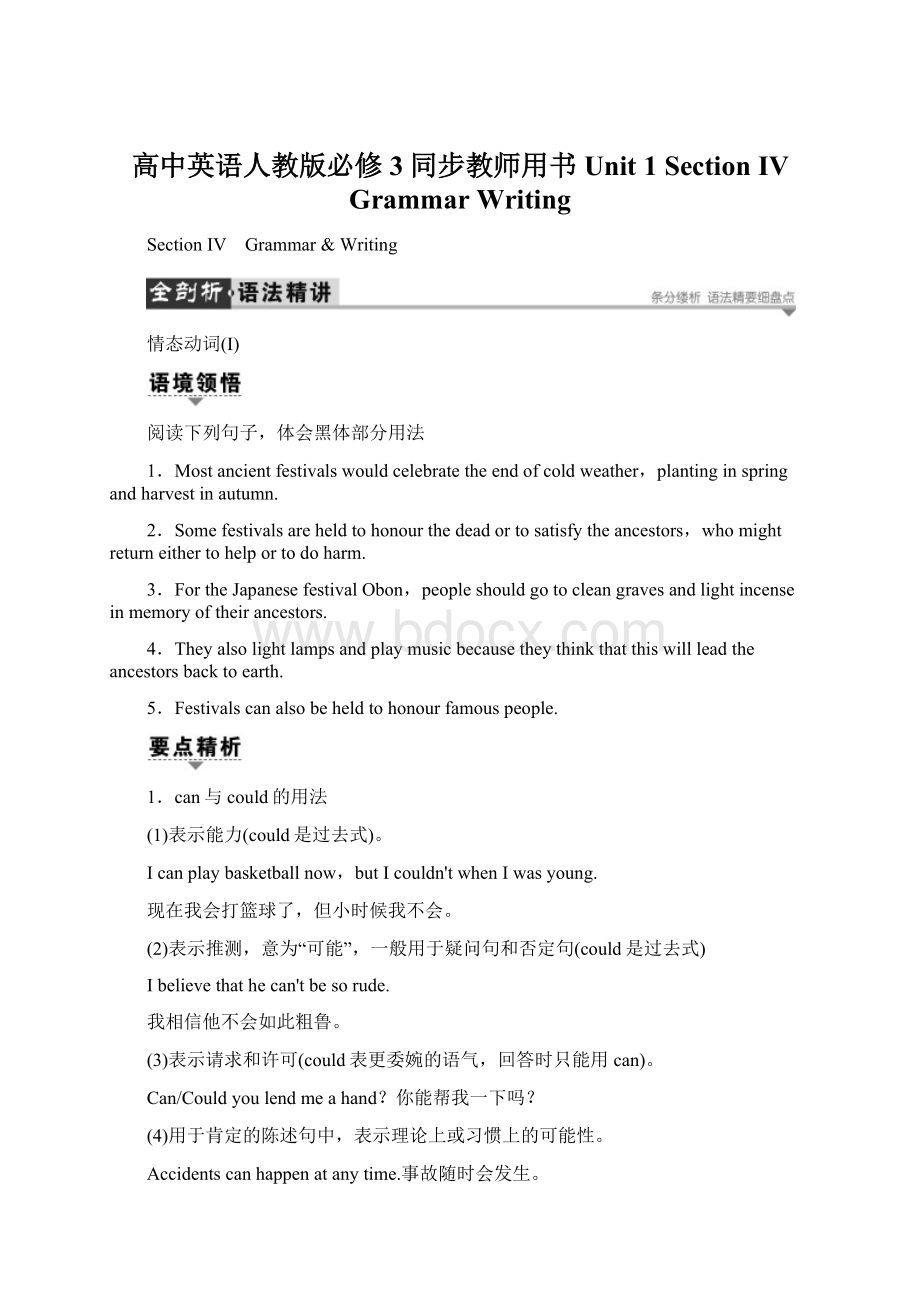高中英语人教版必修3同步教师用书Unit 1 Section Ⅳ GrammarWriting.docx
《高中英语人教版必修3同步教师用书Unit 1 Section Ⅳ GrammarWriting.docx》由会员分享,可在线阅读,更多相关《高中英语人教版必修3同步教师用书Unit 1 Section Ⅳ GrammarWriting.docx(14页珍藏版)》请在冰豆网上搜索。

高中英语人教版必修3同步教师用书Unit1SectionⅣGrammarWriting
SectionⅣ Grammar&Writing
情态动词(Ⅰ)
阅读下列句子,体会黑体部分用法
1.Mostancientfestivalswouldcelebratetheendofcoldweather,plantinginspringandharvestinautumn.
2.Somefestivalsareheldtohonourthedeadortosatisfytheancestors,whomightreturneithertohelportodoharm.
3.FortheJapanesefestivalObon,peopleshouldgotocleangravesandlightincenseinmemoryoftheirancestors.
4.Theyalsolightlampsandplaymusicbecausetheythinkthatthiswillleadtheancestorsbacktoearth.
5.Festivalscanalsobeheldtohonourfamouspeople.
1.can与could的用法
(1)表示能力(could是过去式)。
Icanplaybasketballnow,butIcouldn'twhenIwasyoung.
现在我会打篮球了,但小时候我不会。
(2)表示推测,意为“可能”,一般用于疑问句和否定句(could是过去式)
Ibelievethathecan'tbesorude.
我相信他不会如此粗鲁。
(3)表示请求和许可(could表更委婉的语气,回答时只能用can)。
Can/Couldyoulendmeahand?
你能帮我一下吗?
(4)用于肯定的陈述句中,表示理论上或习惯上的可能性。
Accidentscanhappenatanytime.事故随时会发生。
[明辨异同] can/beableto
can
只有现在时和过去时
表示自身具有的能力
beableto
有各种时态
表示经过努力后具备的能力,相当于manageto(do)
Hecouldswimwhenhewasfiveyearsold.
他5岁就会游泳。
Afteryearsofhardworkhewasabletowintheprize.
经过多年的艰苦努力,他终于获了奖。
2.may与might的用法
(1)表示征求对方的许可或允许(不用might)对方做某事。
—MayIcomein?
——我可以进来吗?
—Yes,youmay/can.——是的,你可以进来。
(No,youcan't.不行,你不能进来。
)
Youmaygonow.你现在可以走了。
(2)表示推测(把握不大),意为“可能”,多用于肯定句。
might比may可能性更小。
Hemaycome,orhemaynot.
他可能来,也可能不来。
Itmay/mightrainthisafternoon.
今天下午可能会下雨。
(3)may用于祈使句,表示祝愿。
Mayyousucceed!
祝你成功!
Mayyouhaveagoodjourney!
祝你旅途愉快!
3.will与would的用法
(1)表示意志或意愿,意为“会;想;要”等。
多表示从主语的主观意志出发,愿意做某事。
Wewilldoourbesttosavethechild.
我们会尽力抢救这个孩子。
Myparentswon'tallowmetostayoutlate.
我的父母不会允许我在外面待得很晚。
(2)表示请求或建议,多用于疑问句。
would语气更委婉。
Will/Wouldyoupleasekeepthedooropen?
请让门开着好吗?
Wouldyoupassmethebottle?
请你递给我那个瓶子好吗?
(3)表示习惯性动作或客观真理,意为“总是;老是”。
will表示现在,would表示过去。
Shewilllistentomusicaloneinherroomforhours.
她独自在房间里听音乐,一听往往就是几小时。
Oilwillfloatonwater.
油总是浮在水面上。
Hewouldgetupearlywhenhelivedinthecountry.
他住在乡下时总是早起。
[明辨异同] would/usedto
would
表示过去反复发生的动作,不强调现在还是否经常发生
usedto
表示过去常常做某事,但现在不这样做了
Hewouldgototheparkassoonashewasfree.
过去,他一有空就去公园。
(动作反复发生,现在还有可能再去)
Peopleusedtobelievethattheearthwasflat.
过去,人们总以为地球是扁平的。
(表示过去的动作,但现在已不再这样认为)
4.shall与should的用法
(1)shall用于疑问句中多表示征求建议,主要用于第一、三人称。
ShallIgetachairforyou?
要不要我给你拿把椅子来?
(2)用于肯定句中多表示说话者的允诺、告诫、威胁、命令、规定、必然性等,主要用于第二、三人称。
Personsunder18shallnotbeemployedinnightwork.
不满十八岁的人不得被雇佣干夜间工作。
(3)should表示劝告或建议,意为“应该;要”。
Youshouldgiveupsmoking.
你应该戒烟。
(4)should表示义务或责任,意为“应该;理应”。
Weshouldlearnfromeachother.
我们应该互相学习。
(5)should表示推测,意为“应该;可能”。
Theyshouldbetherebynow,Ithink.
我想现在他们都已经到了。
(6)should表示惊讶或意外,意为“竟然”。
It'sstrangethatheshouldcomesolate.
他竟然来这么晚真是奇怪。
5.must的用法
(1)表示必须。
(must提出的问题,其否定回答用needn't,表示没有必要)
Allthestudentsmustobeytheschoolrules.
所有学生必须遵守校规。
—MustIgonow?
——我现在就得走吗?
—Yes,youmust.
——是的,你现在就得走了。
—No,youneedn't.
——不,你没有必要现在就走。
(2)表示推测。
(只能用在肯定句中,在否定句或疑问句中要用can或could)
Bettymustbeinthenextroom.Icanhearhertalkingthere.贝蒂肯定在隔壁房间,我能听见她在那儿讲话。
(3)must用于发生了某种与说话人的愿望相反、不受欢迎的事时,意思是“偏偏”、“偏要”、“非得”。
Whymusthegooutinthebadweather?
为什么他偏要在这种坏天气出门?
MustyouwatchTVatmidnight?
你非得在半夜看电视吗?
(4)mustnot表示禁止,意思是“不许”、“不准”、“不可以”等。
Youmustn'tstopyourcarinthebusystreet.
不准把车停在繁忙的路上。
Childrenmustn'tspeaktotheirparentsinthatway.
不准孩子们对他们的父母那样说话。
Ⅰ.选用方框内所给的情态动词填空
can('t),could,may,might,will,would,shall,should,must(n't)
1.WithmyhelpPeter________speakChinesefluentlynow,buthe________notwhenhecameherelastyear.
2.-MayItakethebookhome?
-No,you________.
3.NomatterhowIadvisedhimtogiveupsmoking,he________notlistentome.
4.-CouldIuseyourbikeforawhile?
-Yes,you________.
5.-Wheredidhestaylastnight?
-I'mnotsure,buthe________havestayedathisfriend's.
【答案】 1.can;could 2.can't/mustn't 3.would4.can 5.may/might
Ⅱ.单句改错
1.WhatwillIgetfordinner?
________________________________________________________________
2.Shallyouswimacrosstheriver?
________________________________________________________________
3.Passengerscannottalkwiththedriverwhilethebusismoving.
________________________________________________________________
4.Luckily,everyonecanabletoescapefromtheburningbuilding.
________________________________________________________________
5.Mightyouhaveagoodjourney!
________________________________________________________________
【答案】 1.will改为shall 2.Shall改为Can
3.can改为shall 4.can改为was 5.Might改为May
叙事类记叙文
1.概念:
叙事类记叙文以叙述事件为主,突出事件发生、发展和解决的过程。
2.内容安排:
(1)开头段:
介绍背景,主要介绍时间、地点、人物等。
(2)中间段:
讲述故事的情节。
(3)结尾段:
对全文进行归纳总结,得出结论或是故事的结局。
3.语言特征:
叙事类记叙文以叙述和描写为主,常使用第一人称。
4.注意事项:
(1)重组材料,确定要点。
写作前要进行立意、构思和选材,对提供的材料再加工,确定写作的顺序、要点和重点,拟定使用的句型和词组。
(2)结构完整、前后呼应。
记叙时把与事情有关的六要素都交代清楚。
主题和内容一致,结尾与开头呼应。
[亮点句式]
1.Howunforgettabletheexperiencewasforme!
2.That'saverygoodopportunityformeto...
3.Theprocessismorevaluablethantheresult.
4.Withthedevelopmentof...
5.Nothingismoreimportantthanafactthat...
6.Whatisfarmoreimportantisthat...
7.Comparedwithsomething,wethink...
8.Weweredelayedbecauseofatrafficjam.
9.Hissuccessisduetohishardwork.
10.Thanksforthem,wesucceededin...
11.IfeelhappythatIhavedonesomethingformymother.
12.Iamreallyproudofthisexperience,becauseithelpsmerealizethat...
[写作任务]
假如你是李华,你校的外教要在中国过春节,请你根据以下内容,用英文写一篇100词左右的短文介绍我国的春节,并祝他们节日愉快。
时间:
一般在阳历二月份,中国农历正月初一,前后要持续半个月
风俗:
1.12生肖命名,如狗、猴、虎等,今年是狗年;
2.春节前人们要大扫除,大年夜全家人聚集在一起吃年夜饭;
3.年初一、初二走访亲友,给孩子们压岁钱。
参考词汇:
农历ChineseLunarCalendar
[审题谋篇]
体裁
叙事类记叙文
话题
介绍有关中国春节的情况
时态
一般现在时
人称
第三人称
[遣词造句]
Ⅰ.词汇
1.________ 大扫除
2.________欢聚一堂
3.________聚餐
4.________走亲访友
5.________压岁钱
【答案】 1.agoodcleaning 2.gettogether 3.haveabigmeal 4.visittheirrelativesandfriends5.luckymoney
Ⅱ.句式
1.TheChineseSpringFestivalcomesonthefirstdayoftheChineseLunarYear.ItisusuallyinFebruary.(用定语从句合并句子)
________________________________________________________________
2.IwishthatyouhadagoodtimeattheSpringFestival.(改为简单句)
________________________________________________________________
【答案】 1.TheChineseSpringFestivalcomesonthefirstdayoftheChineseLunarYear,whichisusuallyinFebruary.
2.IwishyouhaveagoodtimeattheSpringFestival.
[妙笔成篇]
________________________________________________________________
________________________________________________________________
________________________________________________________________
________________________________________________________________
________________________________________________________________
【参考范文】
TheChineseSpringFestivalcomesonthefirstdayoftheChineseLunarYear,whichisusuallyinFebruary.Thereisanameforeachyear,suchasthedog,themonkey,thetigeroroneofthetwelveanimals,andthisyearistheyearofthedog.
BeforetheNewYear'sDay,theChinesepeopleusuallygivetheirhousesagoodcleaningandonthelasteveningoftheoldyear,allthemembersofafamilywillgettogetherandhaveabigmeal.OnthefirstorseconddayoftheNewYear,peopleusuallygotovisittheirrelativesandfriendsandgivesomeluckymoneytochildren.
IwishyouhaveagoodtimeattheSpringFestival.
学业分层测评
Ⅰ.完成句子
1.你应该为你的迟到而向老师道歉。
Youshould________________yourteacherforcominglate.
2.我们屏息而待,看谁会在这场选举中获胜。
We________________toseewhowouldwintheelection.
3.我认为他不是一个讲信用的人。
Idon'tthinkheisamanwho________________.
4.除夕烧香祭祖是中国的传统习俗。
It'sthetraditionalcustomtolightincense________________ancestorsattheSpringFestivalEveinChina.
5.我建议你原谅他。
Myadviceisthatyou________________him.
【答案】 1.apologizeto 2.heldourbreath
3.keepshisword 4.inmemoryof
5.(should)forgive
Ⅱ.阅读理解
A
SweetestDayiscelebratedonthethirdSaturdayinOctoberasadaytomakesomeonehappy.Itisanoccasionwhichoffersallofusanopportunitytoremembernotonlythesick,theaged,andchildrenwhohavelosttheirparents,butalsofriends,workmates,relativesandneighbourswhosehelpfulnessandkindnesswehaveenjoyed.
Over60yearsago,whenaClevelandmannoticedthatsomepeople,suchaschildrenwholosttheirparentsandpatientswholayinbed,toooftenfeltforgottenandneglected,hedevelopedinhismindtheideaofshowingthemthattheywereremembered.Hedidthisbygivingthemsmallgifts.Withthehelpofhisfriendsandneighbours,hegavethosepeoplesmallgiftsonaSaturdayinOctober.Duringtheyearsthatfollowed,otherClevelandersbegantotakepartinthecelebration,whichcametobecalled“SweetestDay”.Overtime,theSweetestDayideaofspreadingcheertothepoor,thesickandchildrenwhohadlosttheirparentswasbroadenedtoincludeeveryone,andbecameanoccasionforrememberingotherswithakindactorasmallgift.SoontheideaspreadtoothercitiesallovertheUSA.
SweetestDayisnotbasedonanysinglegroup'sreligiousbeliefsoronafamilyrelationship.Itisareminderthatathoughtfulwordordeedenricheslifeandgivesitmeaning.
Becauseformanypeoplerememberingtakestheformofgiftgiving,SweetestDayoffersustheopportunitytoshowothersthatwecare,inapositiveway.
【语篇解读】 本文讲述了美国甜蜜日的由来及意义。
在这一天,一份小小的礼物就能帮助我们传达对病人、老年人和失去父母的孩子的关爱以及对朋友、亲人等无私关爱的感激。
1.WhichofthefollowinghaslittlerelationshiptoSweetestDay?
A.Visitingsickpeopleofthehospital.
B.Visitingchildrenwhohavelosttheirparents.
C.Givingfriendssmallgifts.
D.Givingflowerstosweethearts.
【解析】 由第一段第二句Itisanoccasionwhichoffersallofusanopportunitytoremembernotonlythesick,theaged,andchildrenwhohavelosttheirparents,butalsofriends,workmates,relativesandneighbourswho